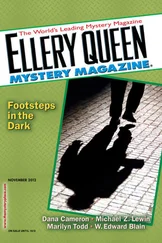“Hate and guilt — and the defenses against them. I’ve put two and two together. Is this permitted, Herr Professor? Is this valid?”
Seligmann said, “One tends to oversimplify in your sort of mathematics, mein Herr. But go on.”
“Then I say to myself: Cazalis’s tensions lie deep. His guilts are profound. His defenses against the unconscious becoming conscious — if that’s a fundamental identification of neurotic behavior — are elaborate.
“Now I observe his marriage. Immediately, it seems to me, new tensions — or extensions of old ones — set in. Even a so-called normal man of 44 would find a first marriage, after a life of overwork and little socializing — would find such a marriage, to a 19-year-old girl, unsettling and conflicting. In this case the young bride was from a thinblooded New England strain. She was emotionally of delicate balance, rather rarefied, on the frigid side, and almost certainly inexperienced. And Cazalis was as he was. I speculate.
“I say: It seems to me Cazalis must at once have found himself involved in serious sexual dissatisfactions, frustrations, and disagreeable conflicts. I say: There must have been recurrent episodes of impotence. Or his wife was unresponsive, unawakened, or actually repelled. He began to feel an erosive inadequacy, perhaps? Yes, and a resentment. It wouldn’t be unnatural. He, the highly successful entrepreneur of the biological process, can’t master the technique of his own marriage. Also, he loves his wife. She is an intelligent woman, she has a fragile charm, reserve, breeding; even today, at 42, she’s handsome; at 19 she must have been extremely attractive. Cazalis loves her as only a man can love who is old enough to be the father of the highly desirable object of his affections. And he’s inadequate.
“So I say: A fear is born. Undoubtedly this fear arises from altogether different causes, but it expresses itself in a disguised form: he becomes afraid he will lose his young wife to another man.”
Ellery drank some coffee and Seligmann waited. The ormolu clock on the mantelpiece kept a sort of truce between them.
“The fear is nourished,” continued Ellery, “by the great difference in their ages, temperaments, backgrounds, interests. By the demands of his practice, his long hours at the hospital assisting other men’s wives to bring other men’s children into the world, by his enforced professional absences from Mrs. Cazalis — frequently at night.
“The fear spreads like cancer. It gets out of control. Cazalis becomes violently suspicious of his wife’s relationships with other men, no matter how slight, no matter how innocent — especially of her relationships with younger men.
“And soon this fear grows into an obsession.
“Professor Seligmann.” Ellery eyed the old Viennese. “Was Edward Cazalis obsessively jealous of his wife during the first four years of their marriage?”
Seligmann picked up his pipe and rather deliberately set about knocking it out. “Your method, Mr. Queen, is one unknown to science,” he said with a smile. “But this of great interest to me. Continue.” He stuck the empty pipe in his mouth.
“Then Mrs. Cazalis becomes pregnant.” Ellery frowned. “One could imagine at this point Cazalis’s fears would recede. But no, he’s passed the point of reasonableness. Her very pregnancy feeds his jealousy and becomes suspect. Isn’t this a confirmation of his suspicions? he asks himself. And he insists — he insists — on taking care of his wife himself. He is undoubtedly excessively devoted, solicitous, and watchful. Gestation unfortunately takes nine months. Nine months in which to watch a fetus grow. Nine months in which to torture himself with a question which at last bursts forth in the full deformity of obsession: Is this child mine? Is it?
“Oh, he fights it. He fights an endless battle. But the enemy is discouraging. Kill it in one place and it springs up, viciously lively as ever, in another. Does he ever tell his wife of his suspicions? Accuse her outright of infidelity? Are there scenes, tears, hysterical denials? If so, they only serve to strengthen his suspicions. If not, if he keeps his raging fears bottled up, then it’s even worse.
“Mrs. Cazalis comes to term, goes through labor.
“And there she lies.
“In the delivery room.
“Under his hands.
“And the baby dies.
“Professor Seligmann, do you see how far I’ve traveled?”
The old man merely waggled the pipe in his jaws.
“Mrs. Cazalis becomes pregnant a second time. The process of suspicion, jealousy, self-torment, and uncertainty-certainty repeats itself. Again Cazalis insists on seeing his wife through her pregnancy. Again he insists on performing the delivery.
“And again his baby dies in the delivery room.
“His second child, dead like the first.
“Under his hands.
“Under those powerful, delicately nerved, practiced surgeon’s hands.
“Professor Seligmann.” Ellery loomed over the old man. “You’re the only being on the face of the earth in a position to tell me the truth. Isn’t it fact that when Edward Cazalis came to you eighteen years ago for psychiatric treatment he had broken down under a dreadful load of guilt — the guilt of having murdered his own two children in the act of delivery?”
After a moment old Seligmann took the empty pipe from his lip. He said carefully, “For a physician to murder his own unborn children under the delusion that they were another’s — this would be psychosis, Herr Queen, no? You could not expect him to follow his subsequent brilliant, stable career, most particularly in the field of psychiatry. And my position, what would that have been? Still, you believe this, Herr Queen?”
Ellery laughed angrily. “Would it make my meaning clear if I amended my question to conclude: ‘the guilt of fearing he had murdered his own two children’?”
The old man looked pleased.
“Because it was the logical development of his neurosis, wasn’t it? He had excessive feelings of guilt about his hates and a great need for punishment. He, the eminent obstetrician, had brought thousands of other men’s children into the world alive, but under his hands his own children had died. Did I kill them? he agonized. Did my obsessive jealousy and suspicions make my hands fail? Did I want them to be born dead and my hands saw to it that they were? I did want them to be born dead. And they were born dead. Therefore I killed them. The terrible illogic of neurosis.
“His common sense told him they had been breech births; his neurosis told him he had performed countless other breeches successfully. His common sense told him that his wife, let’s say, was not ideally constructed for motherhood; his neurosis told him her babies were fathered by other men. His common sense told him he had done his efficient best; his neurosis told him that he had not, that he might have done this or that, or not done that or this, or that had he not insisted on performing the deliveries himself but placed his wife in the hands of another obstetrician, his children would have survived. And so on.
“Because he had an overwhelming compulsion to believe it, within a short time Cazalis had convinced himself that he’d murdered both babies. A little of this mental Schrecklichkeit and he broke. When his wife took him traveling and he came to Vienna — odd coincidence, wouldn’t you say, Professor? — lo, he collapsed again. And went to you. And you, Professor Seligmann, you probed and analyzed and treated and... you cured him?”
When the old psychoanalyst spoke, his rumbling voice held a growl. “It is too many years and I know nothing of his emotional problems since. Even at the time there was a menopausal complication. If in the past few years he has been pushing himself too hard — at the present stage of his life... Often in the middle age people are unable to defend themselves by means of neurotic symptoms and they break down completely into a psychosis. We find, for example, that paranoid schizophrenia is frequently a disease of late middle age. Still, I am surprised and troubled. I do not know. I should have to see him.”
Читать дальше












